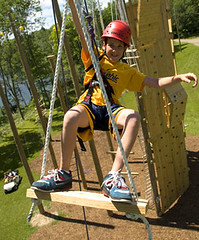In Last Child in the Woods, Richard Louv retells a moment in a restaurant when his son asked, “Dad, how come it was more fun when you were a kid?” Louv had been telling his 10-year old about how he caught crawdads by stringing bits of liver across a creek. When asked to explain, the son replied, “Well, you’re always talking about your woods and tree houses, and how you used to ride that horse down by the swamp.” At first, Louv thought Matthew was irritated and owns up to the fact that like other parents, he can romanticize his own childhood at the expense of his children’s current experience. But Matthew really felt that he had missed out on something, and Louv realized that his own childhood had been different.
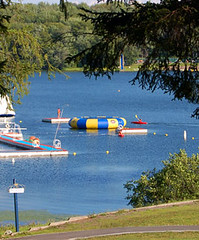 If you’re in Louv’s age bracket, you may also recall a childhood filled with a kind of free, natural play that today seems like an antique artifact compared to current kid’s lives. Lives filled with mobile devices, instant messaging, screen time, digital games and fears of “things” outside. In his book, Louv explores “the increasing divide between the young and the natural world, as well as the environmental, social, psychological, and spiritual implications of that change.” He discusses the accumulating research that implies that secure children (and adults for that matter) must connect with nature to fully develop. This need for contact with the natural world is as imperative as good nutrition and adequate sleep. So, while multiple reasons give us less and less time to connect outdoors, more and more studies suggest that embracing nature is a human necessity.
If you’re in Louv’s age bracket, you may also recall a childhood filled with a kind of free, natural play that today seems like an antique artifact compared to current kid’s lives. Lives filled with mobile devices, instant messaging, screen time, digital games and fears of “things” outside. In his book, Louv explores “the increasing divide between the young and the natural world, as well as the environmental, social, psychological, and spiritual implications of that change.” He discusses the accumulating research that implies that secure children (and adults for that matter) must connect with nature to fully develop. This need for contact with the natural world is as imperative as good nutrition and adequate sleep. So, while multiple reasons give us less and less time to connect outdoors, more and more studies suggest that embracing nature is a human necessity.
The ways in which children understand and experience nature has changed beyond recognition for Americans born during the last two decades. While children today may be more aware of the global threats to our larger environment, they are much less aware of their immediate natural surroundings. As children, Louv and his peers may not have discussed global warming, or holes in the ozone layer, but they loved “their woods” and fields intimately and felt connected to the people and their location in the world. They identified specific bends and crooks in creeks and holes in backyards—explored the woods in solitude, lay in fields listening to the wind and marveled at clouds shape-shifting overhead.
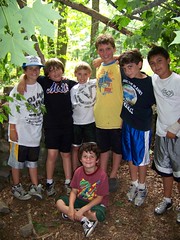 Louv discovered that many people yearn for what they have missed living in de-natured environments and they are consciously making choices and decisions to ensure that they will not be “the last children in the woods.” Families and intergenerational groups are finding ways to better live with nature and each other. Summer camp, for example, is one marvelous way for youngsters to make long-lasting memories and deep connections in natural surroundings. With easy access to the great outdoors and opportunities to develop self-reliance within a nurturing community, today’s campers will remember fun-filled childhoods unplugged from urban life—and share their unique memories with future generations.
Louv discovered that many people yearn for what they have missed living in de-natured environments and they are consciously making choices and decisions to ensure that they will not be “the last children in the woods.” Families and intergenerational groups are finding ways to better live with nature and each other. Summer camp, for example, is one marvelous way for youngsters to make long-lasting memories and deep connections in natural surroundings. With easy access to the great outdoors and opportunities to develop self-reliance within a nurturing community, today’s campers will remember fun-filled childhoods unplugged from urban life—and share their unique memories with future generations.
How can you make sure that you and your kids don’t miss out on the benefits of exploring outdoors? (For the record, I’ve been known to insist that my children at least squish mud between their toes and jump in puddles!)
Deborah-Eve


 While campers have a lot of choice in daily program at Weequahic, that is not the aspect of choice on which I mean. Rather, I’d like to focus on the more global meaning of the word.
While campers have a lot of choice in daily program at Weequahic, that is not the aspect of choice on which I mean. Rather, I’d like to focus on the more global meaning of the word.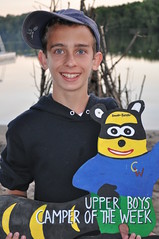 A mentor of mine recently told a story of doctor who works with people with difficult injuries and afflictions. Rather than ask his patients “How are you feeling today?”, the doctor always asked “What are your plans for the day?” Do you see the difference?
A mentor of mine recently told a story of doctor who works with people with difficult injuries and afflictions. Rather than ask his patients “How are you feeling today?”, the doctor always asked “What are your plans for the day?” Do you see the difference?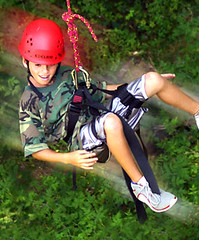 As children mature, they continue to develop and require more experiences where they can make independent choices without parents. If parents don’t allow children to make decisions and do things on their own, they won’t develop confidence or realize that they are not just extensions of their caregivers. It’s a tricky line that parents walk! Sometimes giving children room to spread their wings seems counter intuitive, but in order to grow into a self-reliant adult, children need to struggle without the offer of a quick fix. Even when parents can take care of things, the better choice is to support a child through the process of working through and solving problems. Long after a problem has been forgotten, a self-reliant child will remember hearing, “Wow! You amaze me! You really worked hard to figure that out.”
As children mature, they continue to develop and require more experiences where they can make independent choices without parents. If parents don’t allow children to make decisions and do things on their own, they won’t develop confidence or realize that they are not just extensions of their caregivers. It’s a tricky line that parents walk! Sometimes giving children room to spread their wings seems counter intuitive, but in order to grow into a self-reliant adult, children need to struggle without the offer of a quick fix. Even when parents can take care of things, the better choice is to support a child through the process of working through and solving problems. Long after a problem has been forgotten, a self-reliant child will remember hearing, “Wow! You amaze me! You really worked hard to figure that out.”